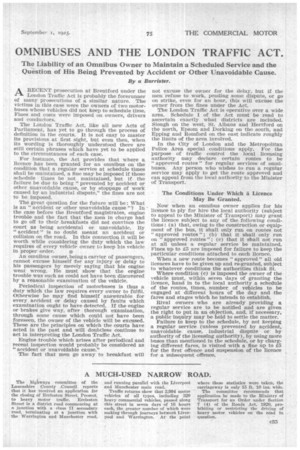OMNIBUSES AND THE LONDON TRAFFIC ACT.
Page 19

If you've noticed an error in this article please click here to report it so we can fix it.
The Liability of an Omnibus Owner to Maintain a Scheduled Service and the Question of His Being Prevented by Accident or Other Unavoidable Cause.
By a Barrister.
ARECENT prosecution at Brentford under the London Traffic Act is probably the forerunner of many prosecutions of a similar nature. The victims in this case were the owners of two motorbuses whose vehicles did not keep to schedule time. Fines and costs were imposed on owners, drivers and conductors.
The London Traffic Act, like all new Acts of Parliament, has yet to go through the process of definition in the courts. It is not easy to master its provisions at first sight, but even then, when its wording is thoroughly understood there are still certain phrases which have yet to be applied to the circumstances of each case.
For instance, the Act provides that where a licence has been granted for an omnibus on the condition that a regular service at schedule times shall be maintained, a fine may be imposed if those schedule times be not maintained, but if the failure be due to being "prevented by accident or other unavoidable cause, or by stoppage of work caused by an industrial dispute," the flues are not to be imposed.
The great question for the future will be : What is an "accident or other unavoidable cause "? In the case before the Brentford magistrates, engine trouble and the fact that the men in charge had to go off to their breakfasts did not convince the court as being accidental or unavoidable. By "accident " -is no doubt meant an accident or collision on the road. In this connection it will be worth while considering the duty which the law requires of every vehicle owner to keep his vehicle in proper order.
An omnibus owner, being a carrier of passengers, cannot excuse himself for any injury or delay to his passengers by merely saying that his engine went wrong. He must show that the engine trouble was such as could not have been discovered by a reasonable examination of the vehicle.
Periodical inspection of motorbuses is thus a duty which the law requires every owner to fulfil. Otherwise he may find himself answerable for every . accident or delay caused by faults which examination ought to have detected. If the engine or brakes give way, after thorough examination, through some cause which could not have been foreseen, the owner of the vehicle will be excused. These are the principles on which the courts have acted in the past and will doubtless continue to act in interpreting the London Traffic Act.
Engine trouble which arises after periodical and recent inspection would probably be considered as "accident or unavoidable cause."
The fact that men go away to breakfast will not excuse the owner for the delay, but if the men refuse to work, pending some dispute, or go on strike, even for an hour, this will excuse the owner from the fines under the Act.
The London Traffic Act is operative over a wide area. Schedule I of the Act must be read to ascertain exactly what districts are included. Slough on the west, St. Albans and Hertford on the north, Epsom and Dorking on the south, and Epping and Romford on the east indicate roughly the limits of the area involved.
In the City of London and the Metropolitan Police Area special conditions apply. For the purpose of traffic control the local licensing authority may declare certain routes to be " approved routes" for regular servicesof omnibuses. Any person who wishes to run a regular service may apply to get the route approved and can appeal from the local authority to the Minister of Transport.
• The Conditions Under Which a Licence May Be Granted.
Now when an omnibus owner applies for his licence to ply for hire the local authority (subject to appeal to the Minister of Transport) may grant the licence subject to any of the following conditions: (a) that, owing to the construction or equipment of the bus, it shall only run on routes not "approved routes " ; (b) that it shall only run on"approved routes " ; (c) that it shall not run at all unless a regular service be maintained. Fines up to :E5 are imposed for failure to keep the particular conditions attached to each licence.
When a new route becomes " approved " all old licences have to be given up and re-granted, subject to whatever conditions the authorities think fit.
Where condition (c) is imposed the owner of the vehicle must, within seven days of granting the licence, hand in to the local authority a schedule of the routes, times, number of vehicles to be engaged at different hours of the day and the fares and stages which he intends to establish.
Rival owners who are already providing a regular service are to be notified and are given the right to put in an objection, and, if necessary, a public inquiry may be held to settle the matter.
Failure to keep to the schedule, by not keeping a regular service (unless prevented by accident, unavoidable cause, industrial dispute or by authority of the licensing authority), by using more buses than mentioned in the schedule, or by charging different fares, is visited with a fine up to £5 for the first offence and suspension of the licence for a subsequent offence,




























